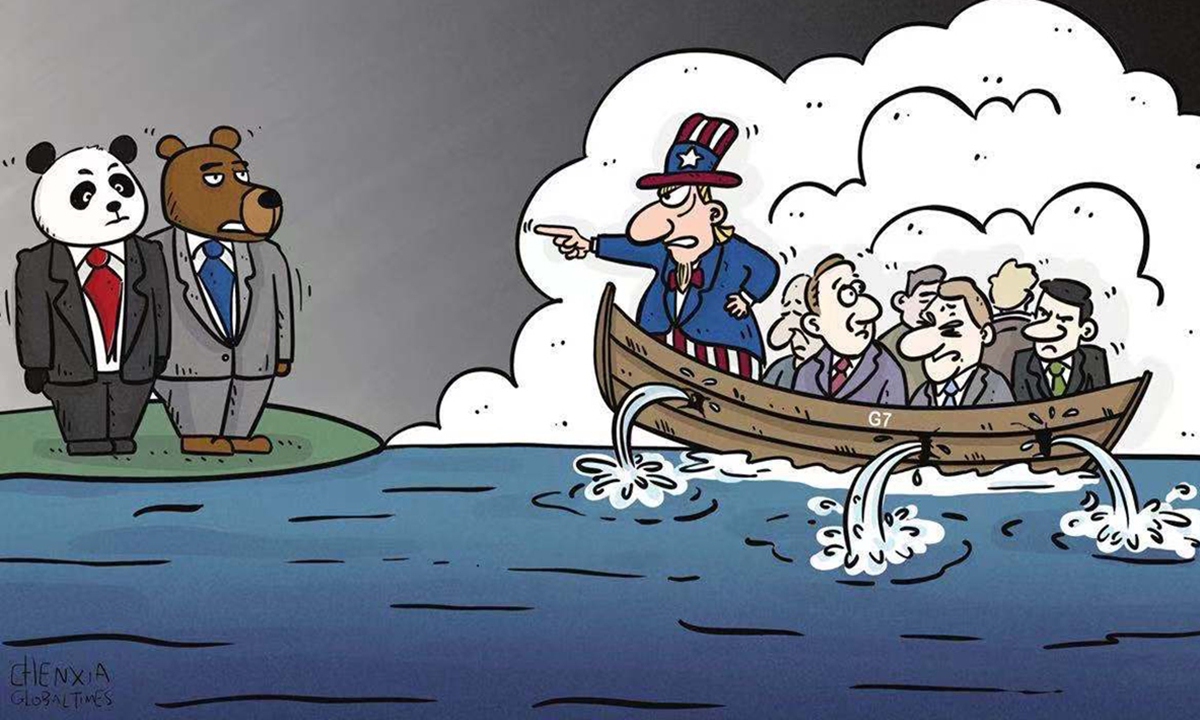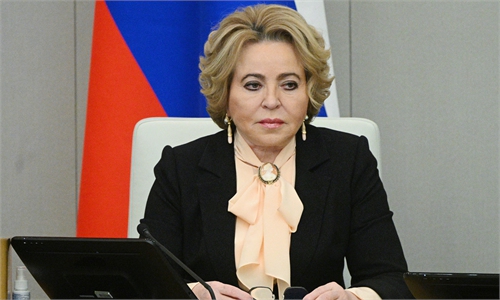It is natural for China to play an active role in the Ukraine crisis: Russian expert

Illustration: Chen Xia/Global Times
Editor's Note:Russian federation council speaker Valentina Matviyenko is on her trip to China from Sunday through Wednesday. But some Western media have been questioning China-Russia relations after the Wagner incident these days, one of the speculations is that China may "distance itself from Russia to some degree." Have China-Russia relations changed as the Western media said? How can China and Russia avoid falling into the discourse trap of the Western media? What's the role China and Russia can play to build a new international order? Academic Director of Russian International Affairs Council, Andrey Kortunov (Kortunov) shared his views with Global Times (GT) reporter Wang Zixuan at the 11th World Peace Forum in July.
GT: Recently, the New York Times and other Western media have questioned that China may "distance itself from Russia to some degree" after the Wagner incident. Have China-Russia relations changed as the Western media said? How can China and Russia avoid falling into the discourse trap of the Western media?
Kortunov: It's clear that the West would like to have an impact on relations between the two nations, emphasizing asymmetry in this relationship and arguing that Russia is losing its independence and becoming a vassal state of China. I think that it is really not the case. There are asymmetries, but the relationship is structured in such a way that these asymmetries do not create major problems. Russia and China agree on very fundamental issues in international relations, I think both sides accept their differences.
For this particular juncture, I do not see fundamental challenges. I think it would be wrong to argue that Russia becomes a vassal of China, if Russia is the vassal of China, why China doesn't impose its will on Russia? Because China understands that it's not the way how it should build its relations with Moscow.
I think it's important not to get information only from the Western media. We should have direct interactions. For example, the Global Times has become quite popular in Russia, because it's a source of first-hand information about China and China 's positions. We should try to use primary sources of information, not through news or opinions which are produced by the Western media.
But definitely, we should try to make sure that the relationship becomes really multi-dimensional, we are just in the beginning of a very long road. It will require a lot of commitment and patience to go along this road.
GT: In your view, where does the biggest security challenge come from in the Eurasia region or even in the world?
Kortunov: If you take a very general approach, I think that fundamental problem is that there is a profound gap between what we need as a global community and what we have in terms of global governance. We need a much stronger multilateral institutions, much more developed international law. We need to strengthen the United Nations, and we need also strong original institutions that would take care of security and development needs that we see.
But unfortunately, the political realities are different. We see a very clear decay of international institutions and international law. We see more nationalism, we see arms races, we see a crisis of arms control, we see that this gap between what we need and what we have is getting deeper and deeper. I think that this is really a fundamental problem of our times. Hopefully it can be resolved in my lifetime. But I'm still moderately optimistic about the instinct of self-preservation that should prevail.
GT: Faced with the complex and changing major power relations, what do you think is the trend of the major power relations in the near future? How could we adapt to this trend, especially for China and Russia?
Kortunov: I would say that if you talk about the China-US relationship, it is already clear that this relationship will be primarily adversarial. There will be no way to get back to where they were in this relationship five or 10 years ago. There are many reasons why this happened, but we cannot go back. But it is still an open question how to manage this competition between China and the US. For instance, they talk a lot about risks. But what does it mean in practical terms? Will it be limited just to very narrow range of areas, like military technologies? Or it will be very broad to get to the level of a trade war. These are open questions. I think everybody is interested to limit this competition to the greatest extent possible.
As for the European Union, we see a different set of challenges about the future of the European strategic autonomy. There are different views on this issue. But it's too early to write the EU off. The EU has different interests compared to those of the US. So, the EU will continue to fight for its strategic autonomy, because that's the only way how a multipolar world can emerge. The great power relationship is a complex issue, and I think that there are many independent variables, which will affect the specific relationship. But what is clear is that we are likely to have a bumpy road ahead of us.
First of all, I think that we should think strategically. I assume Beijing is focused on fighting against of Western hegemonic aspirations. It is important. I don't want to deny the need to confront hegemonic impulses coming from the West, but there should be something positive.
So it is important to have a strategic vision. For instance, you mentioned multilateralism. But this notion of multilateralism is still quite unexplored. It will require a lot of thinking and discussions on how we understand multilateralism, and how we can apply the principle of multilateralism to specific situations. It is also an important practical political issue how we capitalize the competitive advantages of multilateralism and how we minimize the comparative disadvantages of multilateralism.
GT: After attending the World Peace Forum, do you have any new understanding of China's Position on the Political Settlement of the Ukraine Crisis?
Kortunov: I would say that I see the China's plan as an important list of principles. It's not a road map. It's not something that would offer a particular detailed plan how to resolve the conflict. It suggests a couple of principles that can be used to approach this conflict and also similar conflicts, because it's not the only territorial dispute. It's not the only violent clash that we have. From this viewpoint, I think what we now have to do is to take these principles as a template and to work on details. It's about what sequence goes first. It's about specific issues like security guarantees for Ukraine and for Russia. It's about how to affect the resolution of the conflict into broader European or even Eurasian security architecture, which has to be built.
So I think it's a very good starting point, and it's very important that a country like China is behind it, because China is respected in Russia and in Ukraine. China has good relations with both countries. China is becoming more active internationally, and I think it would be natural for China to play an active role in the resolution of the crisis.

